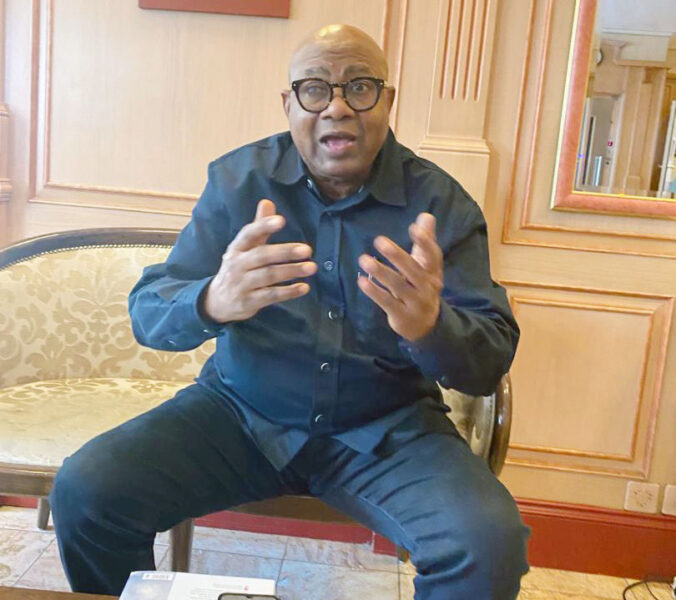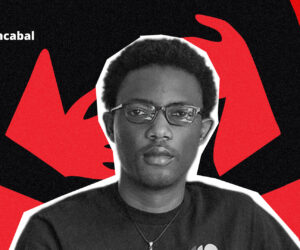1
Comrade Peter Adeyemi, President of Africa and Arab Countries, Public Services International (PSI), a global trade union federation representing 20 million workers, and General Secretary of the Non-Academic Staff Union of Nigerian Universities (NASU), in this incisive conversation with SYLVESTER ENOGHASE, speaks on Africa’s deepening poverty, reckless government borrowing, and the insensitivity of political leaders to workers. Excerpts:
You recently returned from the International Labour Conference in Geneva where issues affecting workers across the world were tabled. Looking at Africa, what would you say is the most pressing challenge today?
We have been facing the problem of war in Gaza, and that in itself has been on for a while. It has also impacted negatively on the workers and every human being that works in that part of the world.
So, I think the problem in Africa today predominantly is the problem of poverty, and we have seen a new trend again of our government being dictated by the great world institutions, the IMF, the World Bank, and that in itself has also contributed to the level of poverty that we are seeing in the continent.
Currencies are being vastly devalued to the point that currency virtually is having no value. And that in itself is a big problem; even as it cut across the problem of indecent work, problem of violation of trading rights, and so on and so forth.
So, I cannot tell you that it is good. Things are going to be very tough. And I think the trade union is trying its best, PSI is trying its best, but the problem is in itself seems intractable.
You gave the highlights of IMF and World Bank influence. Which African countries do you think are most affected by this?
To answer your question, I think I need to contextualise the answer with a preamble by saying that I think that it will take the combination of the Global Union and the African Union to see how we can mitigate and address some of these issues.
In fact, some of the strategies you can only use to resolve this problem have to do with how much we can do to get much more realistic, much more trustworthy governments, governments that will keep to their word.
To give you a direct question, let me say because most of the things we see in governments in Africa, revolve around when they are campaigning, they will tell you they will do A, B, C, D, but at the moment they take office, they begin to do something different.
You have seen it in Nigeria, you have seen it in Kenya; Nigeria and Kenya are virtually being run by the Bretton Woods institutions. It is a massive problem, but I am sure we would survive.
Can you be specific concerning the African countries that are adhering to the advice of the IMF and the World Bank, and by that devaluing their currencies?
Nigeria and Kenya are classic examples. Both countries are almost like “twin brothers” when it comes to surrendering their economic direction to Bretton Woods institutions.
The Nigerian naira has collapsed in value, and the Kenyan shilling is not much better. Poverty is evident everywhere you look. It is the result of governments implementing IMF and World Bank prescriptions without considering their people.
Kenya, Nigeria. If you see today, the Kenyan shilling is virtually like the Ugandan money. If you see the Nigerian naira, it is virtually like what we called then the Ugandan money which we referred to as “shit money.”
Today, you can see it clearly. There is poverty everywhere, and you can say that also in quite a number of other African countries.
But, I think for me, it is so visible in what we see in Kenya and Nigeria. It is like Nigeria and Kenya are twin brothers as far as the issue of adherence to the dictates of the IMF and World Bank.
And many have cried out that with the devaluation of currencies, especially in Nigeria, and the debts skyrocketing, that that is creating a problem for the government and the future leaders to come. So what is your say on that?
Well, you know the irony of the thing is that our Nigerian government will keep on telling you there is nothing wrong in borrowing.
But, there is a lot wrong in borrowing, a lot is wrong in borrowing. Because these are debts that the existing government will not be able to repay, and that becomes a big burden for those who will be coming after them. So I do not, it does not make sense.
And two is that some of this money borrowed are not invested in what you can call something that can be of interest or can positively impact on the Nigerian people.
Some of this borrowed monies are wasted. So, when you go and borrow and do not even invest those money appropriately, then it becomes a problem.
I think you borrow to go and pay salary, you borrow not to do something. In fact, we have seen situations where we borrow to pay money with loan.
So for me, it is like creating more crisis for the upcoming generation. And I think it is not something that I support personally in my capacity as the President of PSI Africa and the other countries.
I think countries should work hard towards generating their own resources and then plug all the loopholes, rather than allow people to go and borrow money that people will just steal or share or use for political campaigns. And for me, it’s a real problem.
So, there are so many things that you can say have gone wrong. And when you talk about an average worker in Nigeria within the African continent, their living standard has not improved.
Sir, Nigeria celebrated Democracy Day a couple of months ago. In the course of the president’s statements on his progress, he said he has done well, he has done perfectly. But, Nigerians are seeing it in different ways. As President of PSI Africa, I know you have holistically looked the claims. Can you be specific on your take on Nigeria’s governance?
Democracy Day is supposed to be a day that we can celebrate the dividends of democracy.
So, if it is about celebrating the dividends of democracy for Nigerian workers, I think there is nothing to write home about.
Nigerian workers have gone back 10 years since the advent of this government because their take-home pay has been reduced in terms of value, and they are contending with so many policies of this government that have further impoverished them.
Democracy is something that you look at from the perspective of democratic governance and see if it has improved your means of livelihood.
It is something you look at, and assess have far you are looking better than when this government took office.
This government is celebrating the removal of subsidy. But what has that done to an average Nigerian? Who is benefiting from the removal of subsidy today other than the state governments? State governments have become suddenly very rich to the detriment of the workers. Sad enough, it is the workers that produce the wealth of the nation.
So, for President Tinubu, he has every reason to say he is doing well. He has removed subsidy, he has streamlined the exchange rate, which in itself is a big problem.
It is a very, very big problem. Those things that government is celebrating, or the president is celebrating, are what are impacting very negatively on the workers. So, for me, this celebration of democracy is good for the politicians who think they have done well, not only done well in terms of some of those things that I have mentioned, but they have also done well in terms of how much money they have made individually.
If you know what those in Senate and the House of Reps collect as constituency allowance, it is humongous. And you hardly go to those constituencies and see anything. So, it is good for them.
The politicians can celebrate, but I am not sure there is any worker in Nigeria who collects paid salary that would tell you he is in a celebrating mood.
Let us come to an aspect of the private sector in Nigeria. The issue of multiple taxes and tariffs, mainly from the consumer that is going to be generating money for the government and others, is actually affecting or impacting negatively on the private sector. What is your take on this? What is your advice to the government on how they can get out of this?
No. When government decides to make money by all means, it means that it will shut its eyes to what is going on, even in the private sector or the public sector.
I think some of the policies that we have seen driven by this government have also not been very good, even for the private sector.
When you import or when you bring goods in, you do this importation, let us say, if you talk of vehicles generally, vehicles are bought at, you can say, at least reasonable amounts. Because you cannot be talking of a brand new vehicle in Nigeria, you see most of the vehicles that ply our roads are vehicles that have been used in Europe.
But, if you get these vehicles from Europe at virtually a very small amount of money, when you get to Nigeria, the amount of money you are going to use to clear those vehicles is beyond the reach of an average person.
So, it becomes a problem. You ask yourself: those policies, are they directed towards assisting the people, or are they supposed to be policies that will take away enjoyment of life from our people? I don’t know how the private sector is coping now.
Maybe you see how a few of the people in the private sector, industrialists and whatever, are making their money, the Dangotes of this world and all the rest of it.
But, I think for government, government has to look at the entire processes, the entire policies as far as driving the economy is concerned, also as a part of the private sector.
I think there is a need for government to have what you can call maybe a policy or some conference or dialogue with those in the private sector and see how the current policies affecting the private sector can be moderated.
Unfortunately, we have seen what the president has done, he has gone to the same private sector to go and meet those he calls “wise men.”
Does your take now implies that these policies are negatively impacting on the private sector? Of course!
These policies that we are talking about that are offending the private sector. They are policies induced by those prominent private sector drivers.
Because if the president said these are the wise men for everything that has to do with the economic policies of the country, these wise men, majorly drawn from the private sector, are the ones dictating the pace.
So, you ask yourself, do you really have any reason to complain?
Last year, the Federal Government of Nigeria signed a minimum wage of N70,000 for workers, and to date, most of the states are not implementing this minimum wage, although some of them will just jump at the price and say they are paying for workers. What is your take on this?
Again, Nigerians are worried that labour movement on the side are not fighting the cause, pressuring the government to either implement this minimum wage or bring policies that will bring security to Nigerians. What is your take on this?
The way the minimum wage is set, the processes that led to the N70,000 minimum wage, did not follow the pattern of what we used to do at the tripartite. This current one was left to the president to determine. So, it was taken away completely from the tripartite.
They reached a point, they made some proposals, then the labour said, “No, we don’t agree.” Then they went and left it to the presidency, and the presidency was the one that came with the N70,000.
It was not a result of collective bargaining, so we must get that clear. It completely did not follow the pattern of what we used to do. And you also saw that when the N70,000 was announced, labour was present, labour was physically present at the villa, and they commended the president. They sang solidarity songs. So, from that position, politically, the government behaved as if they are the messiah, not even the labour.
That N70,000 was not as a result of the work of labour, it was the president. I later don’t know whether what we used to do, signing of the outcome of the negotiation, was done. And I was told that the president of the country said that if they want something more, he would be willing to give, but he would increase the price of the PMS. That’s what our leaders said, and they said that was the reason why they accepted N70,000.
But, I think that was wrong. If the president has said that, you have to come back and consult with your constituents, Nigerians, to say, “We have reached this deadlock. The president has said N70,000, which he thinks is big money, but if we want to ask for more, he would be willing to pay, but he has to increase the price of the PMS(petrol).” So, they did not do that to collect the mandate.
I think one of the problems that we are having right now is the fact that if you reach a crossroad in negotiation, you have to go back to your constituents. The beauty would have been if you come back to your constituents and we said go ahead. Why? Nobody will complain now. Because when the man said if we want more, you people said no, let us stay.
Despite all of that, the president eventually also went ahead and pushed the price out.
So, what we have today is not a minimum wage. If you do mathematical arithmetic, the minimum wage is just a little bit above $44. That is what we expect an average Nigerian worker, at least at the lower realm of the salary structure, to earn to survive for 30, 31 days.
So, it shows that our government and employers are insensitive. It is unjustifiable. It’s unsustainable. It is a joke.
The N70,000 minimum wage that is paid in Nigeria is a huge joke, because it can’t even buy you a bag of rice, even with all the celebrations. Assuming all you do is just buy what you need to buy rice with your salary, N70,000 cannot get you even a bag of rice. So, I think we need, even as we speak, to start talking about negotiating the minimum wage again.
As PSI Africa president, how do you look at this in terms of social safety net, which the ILO and others discussed during the recent international labour convention in Geneva?
Look, I am not sure that our government, the Nigerian government, has gone into anything that you can call serious business when it comes to all of these welfare packages and social networks.
Our government seems not to show concern. And the irony of the thing is that government, you can’t be talking of ILO, social welfare, and all the rest of it, when our country has even signed a number of conventions and has not been able to implement them.
Because there are a whole lot of things that are out there, talk of child labour, ILO has talked about child labour, ILO has talked about decent work, and a whole lot of things.
But, where is the mechanism of government to even monitor what employers of labour are doing? You have just mentioned here that quite a number of state governments have not even implemented the minimum wage. Is it new?
The minimum wage that was negotiated and agreed to some years back, even before the advent of this administration, some state governments refused to pay, to implement. And the question you should ask yourselves is, what are we doing as labour movements to interrogate those situations?
Are the labour movements now going to resign their collective faith to God? Because even right now, like you mentioned, a whole lot of states have not been able to implement the new minimum wage.
I’ve had NLC talk about moving from one state to the other, to go ahead and force implementation of this, but it is just all talk, no movement, very, very unfortunate. You ask yourself, is it that we people are already overwhelmed? So, there is no way you can start talking about all of these things when even the minimum is not implemented.
Social welfare, I agree with you, is done not at the national level, it is done by various employers, depending on their sensitivity. Some employers provide social welfare for their workers. But essentially, government, I am not sure government employees are enjoying anything like that.
You see, but for the law establishing the pension commission, you used to know what used to happen in our country, even for pensioners to collect their pension used to be a problem. But for that law that makes it easy now for pensioners to be paid, we would still be in that mess. So, I think there must be concerted effort on the part of the labour, which I am a part of, to begin to put pressure on government.
And it is very important that labour must be very careful when they talk of our involvement in politics. Because if you have a government that does not really want to do anything for workers and finds that you are playing politics, they will completely walk away from you. So, I think it is very important. It does not mean that labour cannot show interest in politics, but we must not play politics.
If we want to play politics, we will leave, we will just leave and allow those who want to drive the process. Because you cannot do two things at the same time. You cannot be aspiring to be a governor, or you cannot be aspiring to be a senator, or to be president of Nigeria, and you sit down in the labour movement calling yourself NLC president. There will be conflict of interest.
So, I think some of the things that we have done also that have also created problems for us, which nobody is talking about, is the problem of how do we manage our fight with government without being seen as playing politics. It is very important, because if government knows that, or somebody in government feels that some of the things we are pushing are deliberately to discredit the government because we have an ambition, government will just tell you, you can go to hell.
So, I think it is very, very important for us to be sensitive, careful. There must be a conscious agenda on our part at the labour movement to try and change the narrative. We must try everything possible, even if it means doing a talk show, how do we re-strategise to begin to regain confidence in Nigeria?




